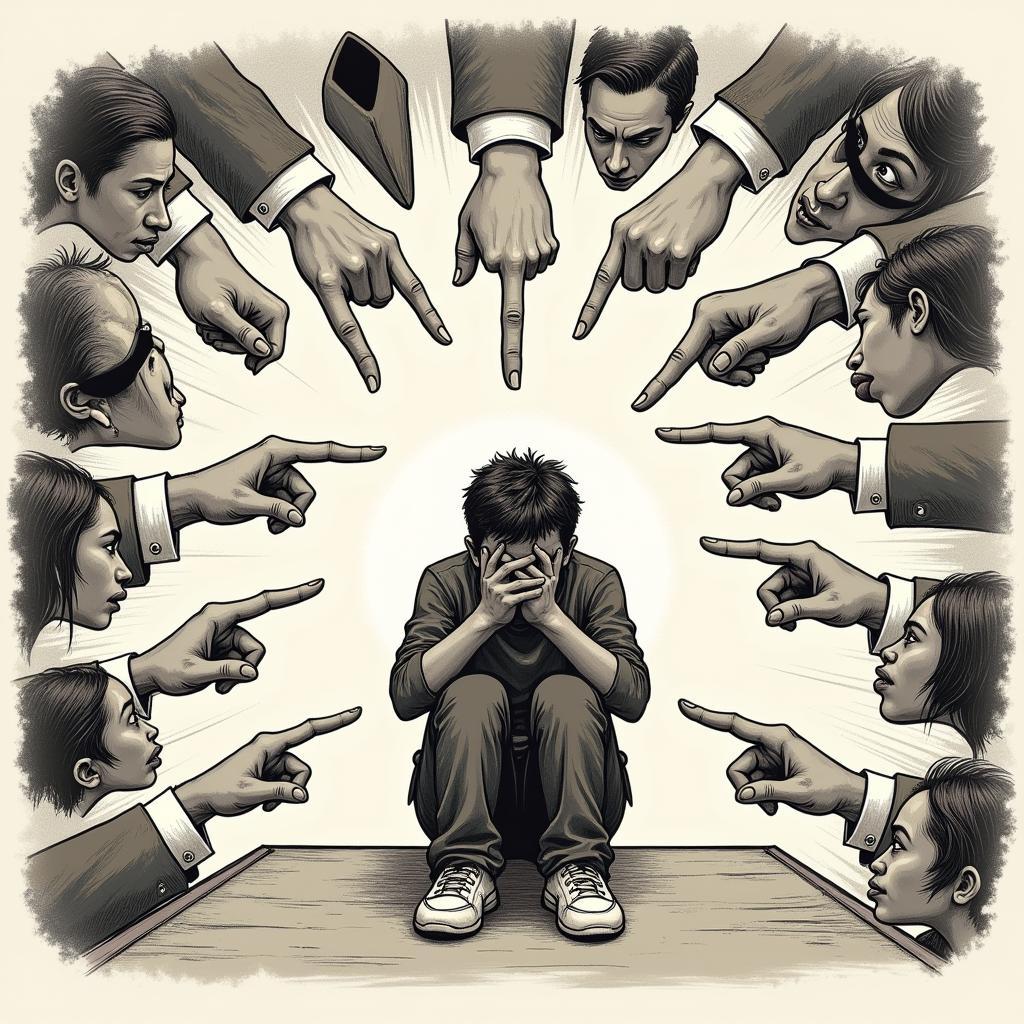The concept of a “Society Of Shame” permeates many aspects of modern life. From social media pressures to public shaming campaigns, the weight of societal judgment can be immense. But what exactly constitutes a society of shame, and how does it impact individuals and communities? This article explores the complexities of living in a society of shame, its potential consequences, and pathways towards fostering empathy and understanding. the society of shame
Shame is a powerful emotion, deeply rooted in our social nature. It’s the feeling of being exposed, flawed, and unworthy of belonging. In a society of shame, this feeling is amplified and weaponized, often used to control behavior and enforce conformity. This can manifest in various forms, from subtle social cues and exclusion to overt public humiliation and online harassment.
Understanding the Dynamics of a Society of Shame
A society of shame thrives on judgment and comparison. It fosters a culture where individuals constantly evaluate themselves against perceived societal norms, leading to feelings of inadequacy and fear of social repercussions. This constant pressure to conform can stifle individuality, creativity, and authentic self-expression.
What drives this phenomenon? One contributing factor is the pervasive nature of social media, which often presents a curated and unrealistic portrayal of life. This can lead to social comparison and a sense of falling short. Another element is the increasing polarization of public discourse, where dissenting opinions are often met with swift and harsh condemnation.
The Impact of Public Shaming
Public shaming, a hallmark of a society of shame, can have devastating consequences for individuals. The intense scrutiny and public condemnation can lead to anxiety, depression, and even suicidal thoughts. Furthermore, the digital footprint of shame can linger for years, impacting future opportunities and relationships.
 The Devastating Impact of Public Shaming
The Devastating Impact of Public Shaming
Is Shame Always Negative?
While often viewed negatively, shame can also serve a social function. In some cultures, honor and shame society are intertwined, where shame acts as a mechanism for maintaining social order and upholding cultural values. It’s crucial to differentiate between healthy shame, which can motivate positive change, and toxic shame, which leads to self-destruction.
Moving Towards a Society of Empathy
How do we navigate and ultimately transcend a society of shame? One crucial step is fostering empathy and understanding. This involves recognizing the shared human experience and acknowledging that everyone makes mistakes.
 Building Bridges of Empathy
Building Bridges of Empathy
Challenging Shame Narratives
Another vital step is challenging the narratives that perpetuate shame. This includes questioning unrealistic societal expectations, promoting self-acceptance, and celebrating diversity. We need to create spaces where vulnerability is valued and where individuals feel safe to express themselves authentically without fear of judgment.
“Shame thrives in silence,” says Dr. Emily Carter, a renowned social psychologist. “By openly discussing our experiences with shame, we can dismantle its power and create a more compassionate society.”
Cultivating Self-Compassion
Cultivating self-compassion is essential for navigating a society of shame. This involves treating ourselves with the same kindness and understanding that we would offer a friend in need. It means recognizing our inherent worthiness, regardless of our perceived flaws or shortcomings.
we have lost the impact of shame in our society signifies a shift in societal values. It indicates a need for deeper reflection on the role of shame in our lives and how it impacts our interactions with others.
“Embracing our imperfections is a radical act of self-love in a society that constantly pushes us towards unattainable ideals,” adds Dr. Carter. “It’s about recognizing that our flaws are part of what makes us human.”
 The Power of Self-Compassion
The Power of Self-Compassion
men fear me society shames me highlights the complex intersection of gender and shame. Societal expectations and stereotypes can contribute significantly to feelings of shame and inadequacy.
Building a More Compassionate Future
The journey towards a more compassionate society requires collective effort. It starts with individual acts of kindness, empathy, and understanding. By challenging shame narratives and fostering self-compassion, we can create a world where everyone feels a sense of belonging and worthiness. shame society vs guilt society presents different cultural perspectives on how these emotions are experienced and expressed. Understanding these differences can contribute to greater cross-cultural understanding and empathy. Ultimately, navigating the society of shame requires us to cultivate a culture of empathy, where vulnerability is embraced and human connection is prioritized. This is the foundation for building a more peaceful and just world.
In conclusion, understanding the dynamics of a “society of shame” is crucial for promoting positive change. By fostering empathy, challenging harmful narratives, and cultivating self-compassion, we can begin to dismantle the structures that perpetuate shame and build a more inclusive and compassionate future.
FAQ
- What is a society of shame?
- How does social media contribute to a society of shame?
- What are the consequences of public shaming?
- How can we challenge shame narratives?
- What is the importance of self-compassion in a society of shame?
- How can we build a more compassionate society?
- What is the difference between shame and guilt?
Need Support?
When you need support, please contact us. Phone: 02043854663, Email: [email protected] Or visit us at: Khu 34, Bac Giang, 260000, Vietnam. We have a 24/7 customer support team.